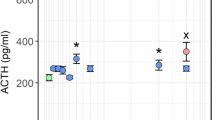Abstract:
In studying the whole-body response of chinook salmon (Oncorhynchus tshawytscha) to various stressors, we found that 5-hour exposure to elevated temperature (mean 21.6°C; + 10.6°C over ambient) induced a marked increase in Hsp90 messenger RNA accumulation in heart, brain, gill, muscle, liver, kidney, and tail fin tissues. The most vital tissues (heart, brain, gill, and muscle) showed the greatest Hsp90-mRNA response, with heart tissue increasing approximately 35-fold. Heat shock induced no increase in plasma cortisol. In contrast, a standard handling challenge induced high plasma cortisol levels, but no elevation in Hsp90 mRNA in any tissue, clearly separating the physiological and cellular stress responses. We saw no increase either in tissue Hsp90 mRNA levels or in plasma cortisol concentrations after exposing the fish to seawater overnight.
Similar content being viewed by others
Author information
Authors and Affiliations
Additional information
Received October 1, 1999; accepted January 21, 2000
Rights and permissions
About this article
Cite this article
Palmisano, A., Winton, J. & Dickhoff, W. Tissue-Specific Induction of Hsp90 mRNA and Plasma Cortisol Response in Chinook Salmon following Heat Shock, Seawater Challenge, and Handling Challenge. Mar. Biotechnol. 2, 329–338 (2000). https://doi.org/10.1007/s101260000005
Issue Date:
DOI: https://doi.org/10.1007/s101260000005



